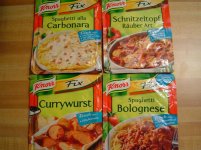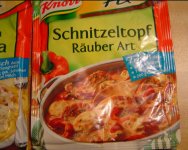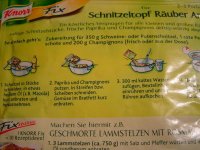having spent a lot of time in Germany and by business travel also the low countries, Sweden, Norway, Italy, France & UK, I'm sitting here trying to compose a list of dishes one can consider
"near exclusively" German.
there's a couple problems - historically what is "Germany" varies rather a lot - even excluding the WW2 events. next is the problem that 'everything has spread to everywhere' - when I was in Germany as a student there were no supermarkets, no department stores, it was all individual shops in their specialties. when you went into a shop you saw stuff that you'd never seen before. twenty years later, you find the same thing in the German department stores you'd find in any USA mall....
here's my list of suggestions:
sauerbraten - as mentioned. it's not unknown, but it is not 'common' outside Germany
Eisbein (ice leg(?)) - pork shanks - come in boiled and roasted variety (Schweinshaxe/ pork shank) - depending on region. the difference the the German approach is these are often cooked "all by themselves" and served with sides vs. our more typical 'hamhock & bean" dish.
there is a notable Berlin exception/specialty: hock in pea soup. also the Berliner-Weisse - raspberry juice in beer.
spaetzel - this also has a number of regional/recipe variations - the cheese doodle shape to thin strips (Schwarzwald / Black Forest style) - recipes, some with milk, some with just water, some with just nutmeg, others all seasoned up.
kloss - dumplings - major ingredients grated potato, second style stale bread - these are round, apple size dumplings - very unusual to find in USA. without question there are more methods and recipes for Kloess than cooks.....
weisswurst
gelbwurst
speck
scwarzwalder
basically all the stuff we call "cold cuts" aka Aufschnitt - but there are a number of specialty types that are seldom seen except in a import deli. put simply,,, Oscar Mayer and BoarsHead have not taken over the German market - every town has one or more butchers who make the stuff slightly different and the types/varieties are near endless. now the really unfortunate part a lot of German dishes use cold cut items in their preparation and it's pretty dang difficult to get the real taste without the real thing....
which creates the Wurst-salat
somewhat thicker slices, julienne of various cold cuts in a bowl served with small pickles (typical would be a gherkin style) and sometimes cubes o/ strips of cheese.
Quark - something between cream cheese and sour cream - I've never seen outside Germany / nordic regions....and have never figured out how to 'duplicate it'
Spaetzi - mix of coke & orange crush/soda
cucumber salad - thin sliced cucumbers & thin sliced onion marinated in oil/vinegar
similar also: large grated radish salad - same but usually served with a dollop of sour cream.
Leberkaese / liver cheese - it does not contain liver or cheese, go figger - closest description would be hot baloney - but it's much tastier. served hot, meatloaf style.
wild game - certainly not unique to Germany, but perhaps more common.
pastries - ah, <sigh> no end to that category - we just don't have the shops/bakeries/selection that exists in Germany/Austria/Switzerland/et al.....
warm potato salad - the mayo style potato salad is uncommon in Germany. warm boiled potato chunks dressed with pork fat/oil & vinegar/wine, liberal sprinkling of 'speck / bacon' - this dish is also frequently seen in US.
"Salat" in general,,, the 'tossed' US style is uncommon. a common side is a dressed salat of finely julienne root crops - another is the "Feld-salat" (Field salad) which is a mix of greens - tho short on "leaf lettuce" - usually with a vinaigrette. must admit, never did learn the secrets of the German "Salat" prep world....just ate them.
fish - hummm, the link is good stuff, but it talks about Emden - which is way up on the North Sea. one sees very little herring in Frankfort and just about none in Munich. in Sweden you can make two weeks meals out of the herring buffet; been there, done that (g)! every sauce & seasoning you can think of and some you've prolly never ever thought of - but all really good stuff.
but fresh water fish is common down south - our little village has a "FischFest" every year (grilled on sticks over an open fire.) curiously deep fried whole carp is a specialty - carp is not widely eaten in US.... trout / Forellen is commonplace - but there's too many mouths and not enough fish to make it widely consumed. depending on region there's any number of other freshwater fish consumed but again with limited natural resources (lakes/streams/land for fish farming...) it is a restricted commodity.
vegetables - root crops are far more common. the German climate does not do tomatoes and green beans well - being cooler the brassicas (aka 'cabbages') and root crops like turnips, beets, parsnips, rutabaga, etc. are far more common. potatoes of course abound - mashed potatoes (Kartoffelpureee) is again not uncommon but often not the first thing offered - fried, boiled, roasted is the usual method.
and for Christmas cookies - those with the bakers ammonia - aka hartshorn. very uncommon taste in USA cookies.

 sorry...I couldn't resist
sorry...I couldn't resist 





